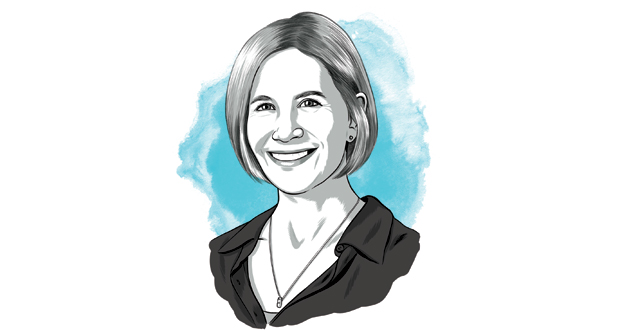
Jorey “Shosh” Friedman has spent 23 years at SB Architects in Miami, entering the hotel space after designing a 350-key hotel in Hokkaido, Japan, for that company. She recently shared with LODGING how, after graduating with an architecture degree from Cornell, she grew into the hospitality space as SB Architects became one of the top hospitality design firms in the country, working with luxury brands such as Ritz-Carlton, St. Regis, Auberge, and Kimpton.
Can you describe your career journey?
I graduated with a B.Arch degree from Cornell University’s Architecture, Art, and Planning 5-year program. I grew up in a “project”-driven family where something creative was always happening. After graduation, I interned for H2L2, a sizable international firm headquartered in Philadelphia, Penn., before joining my current firm.
Among my mentors, I count my father, who first suggested I pursue architecture, and my mother, who was always supportive and hugely responsible for my sticking with this profession. Others were my Cornell professor Maria Romanach, who, as a successful woman in the field, also served as a role model in this largely male-dominated profession. From SB, my mentors include Richard Graham, Joe Andriola, and Scott Lee, who helped guide my approach to design—and specifically hospitality design—but also my advancement within the SB culture as a leader.
What is the focus of your position as vice president and principal at SB Architects?
My strength and focus has always been on design. However, as one of just two principals in the Miami office, I now find myself handling more of the business and cultural aspects of our firm than personally “laying down the ink” as I did before. I do, however, stay intimately engaged throughout the entire design process, offering assistance and mentorship to the younger staff every chance I get. As it was never my desire to be a solo practitioner, I get immense gratification seeing a project come alive as a shared process. I believe that architecture is the ultimate team sport. It really does take a village to get a building built, or to build a village.
How do you view the future of the hotel industry?
I think the future is looking very exciting, particularly from the architect’s point of view. As the trend leans towards experiential and immersive travel, it gives us as hospitality design architects the opportunity to fully indoctrinate ourselves in a culture to which we might not otherwise be exposed. We get to study all aspects of that particular place—how the traditional or regional architectural styles evolved, what the local materials are, what the core culture is like, and so on. We then get to take all of that information and reinterpret it into something that is current, meets market demands, incorporates newer building technologies and materials, and is unique, yet very much “of the place.”
The future of the hotel industry is evolving as our social culture evolves. Hotel lobbies are now social experiences, great WiFi is a must, and everywhere you go should have the potential to be an “Instagrammable moment.” But, regardless of the trends, it is and will always remain our goal to create a built environment that respects the culture, natural surroundings, and to ultimately enhance the guest experience.
Are there any special challenges that concern you?
From an industry perspective, keeping pace with technology is an ongoing challenge. Hotels and resorts take a substantial amount of time to conceive, design, and build. With technology moving so quickly, it is very difficult to predict what the latest and greatest technology will be in terms of operations and the guest experience once that hotel is actually up and running. Building a hotel that is able to sustain technological advances is still an ongoing challenge in this industry.
What do you like best about the hotel segment?
As an architect practicing in the hospitality segment, I love the diversity of design I am afforded—not just for between projects, but even within each project. Working for an international firm in the hospitality industry offers many unique opportunities. The fact that I travel to, and fully experience, places and cultures that I may not have ventured to on my own, is amazing. And then to be able to envision and create something that fits into that environment—and actually gets built—is mind-blowing.











